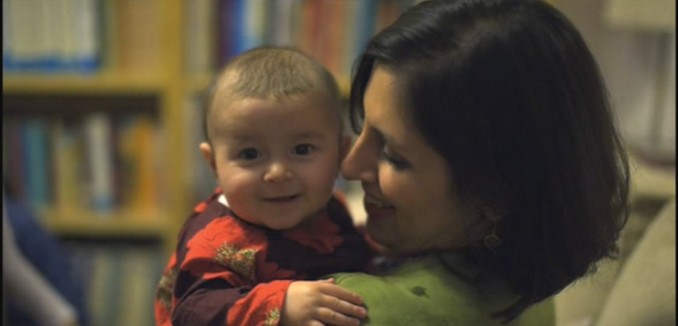The husband of a British-Iranian charity worker who was sentenced to five years in prison by an Iranian court last week said that his wife is being held as a “bargaining chip,” The Evening Standard reported on Tuesday.
Richard Ratcliffe, who was recently allowed to speak to his wife, Nazanin Zaghari-Ratcliffe, explained that she feels “desperate” as “there’s nothing she can do. She’s tried good behaviour, tried confessing [to false charges] and she’s still being held as a bargaining chip.”
Zaghari-Ratcliffe, an employee of the Thomson Reuters Foundation, was arrested and separated from her toddler daughter, Gabriella, as she was preparing to leave Iran after visiting family in April. She told her husband that by her calculation, she has been apart from her daughter for a fifth of the child’s life. “I can’t bear to be here, separated from my baby, one day more. It’s horrendous,” Ratcliffe recounted his wife saying.
When Ratcliffe asked his wife to specify what charges she was facing, she checked with a guard and responded that they were “national security-related.” It isn’t clear if she was unaware of the actual charges or prevented from revealing them.
Zaghari-Ratcliffe is in the high-security wing of Iran’s notorious Evin prison, which is run by the powerful Islamic Revolutionary Guard Corps (IRGC). She was previously kept in solitary confinement for 45 days, but is now believed to be in a cell with another prisoner. When her parents and daughter come to visit, guards cover their heads with sacks so they can’t see where she’s being held.
“They isolate you, blindfold you, put a bag over your head and make you face the wall,” said Ratcliffe, who spoke to former detainees. “There are two or three interrogators and the most senior you’ll never see. He’ll only ever be a voice. They question you relentlessly, and go through all your personal emails to build a case.”
An editorial in The Telegraph last month urged the UK not to upgrade its diplomatic ties to Tehran “while the citizens of this country are being used as pawns by Iran.” According to The Evening Standard, the day before Zaghari-Ratcliffe was sentenced, the UK appointed an ambassador to Iran for the first time in five years.
Reuters reported in July that the six dual nationals arrested in recent months comprised “the highest number of Iranians with dual-nationality detained at one time in recent years to have been acknowledged.” One more dual national, a former member of the Iranian nuclear negotiating team, was arrested in August. Many analysts believe that Iran is “seeking concessions from the West in exchange for releasing” dual nationals, the Associated Press wrote that month.
Other dual nationals currently detained in Iran include Homa Hoodfar, a Canadian-Iranian scholar who was arrested earlier this year when she returned to Iran to see her family and has recently been hospitalized; American-Iranian businessman Siamak Namazi and his father, Baquer Namazi; British-Iranian businessman Kamal Foroughi; and Nizar Zakka, a Lebanese national with U.S. permanent residency.
The UK’s Foreign and Commonwealth Office upgraded its travel warning in July, emphasizing that dual nationals may be “arbitrarily detained in Iran.” The UK’s warning is similar to one issued by the U.S. State Department, which warned in August that citizens visiting Iran could be “unjustly detained.”
In Why Does Iran Keep Taking American Hostages?, published in the September 2015 issue of The Tower Magazine, Iran expert Ali Alfoneh described the regime’s detainment of foreign and dual-nationals as “a perfectly normal procedure and political practice in the Islamic Republic. That has been the case since the first day of the revolution and continues until today.”
[Photo: Madad Shah / YouTube ]




